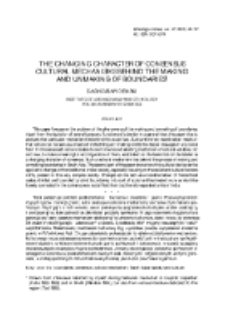- Search in all Repository
- Literature and maps
- Archeology
- Mills database
- Natural sciences
Advanced search
Advanced search
Advanced search
Advanced search
Advanced search

Object
Title: The changing character of consensus. Cultural mechanisms behind the making and unmaking of boundaries
Subtitle:
Publisher:
Institute of Archaeology and Ethnology Polish Academy of Sciences
Place of publishing:
Description:
Type of object:
Abstract:
Tekst podejmuje problem przekształcania — tworzenia i znoszenia — granic. Poza wyróżnieniem różnych typów i funkcji granic, autor analizuje konkretne mechanizmy związane z tym faktem społecznym. Wyciągając z nich wnioski, autor postuluje by spojrzeć na kulturę jako środek uosabiający i uwidaczniający stale zachodzące pęknięcia i podziały społeczne. W jego rozumieniu każda kultura generuje związany czasowo mechanizm selekcjonujący zmienne kulturowe, stare i nowe, by stworzyć ich znaczącą rekonfigurację — ustanowioną w oparciu o podstawę, którą możemy nazwać płynną naturą współistnienia. Prezentowany mechanizm kulturowy leży u podstaw procesu wytyczania i znoszenia granic w Południowej Azji. Druga część tekstu pokazuje jak to ujęcie oddziaływania mechanizmu kulturowego może zostać zastosowane do rozumienia zmian zachodzących w tradycyjnym społeczeństwie indyjskim, w którym istnienie licznych granic społecznych i kulturowych, w sposób szczególny charakteryzuje to niezwykle złożone społeczeństwo. Zmiany rekonfiguracji podziałów społecznych są szczególnie widoczne w przekształceniach dawnych kast, dzielonych i odgraniczonych ścisłymi granicami, w rodzaj społecznych całości traktowanych raczej jako luźno powiązane tożsamości
References:
Barth Fredrik 2000, Boundaries and Connections [in:] ed. Anthony P. Cohen, Signifying Identities. Anthropological Perspectives on Boundaries and Contested Values, Routledge, London— New York, pp. 17—36
Brunet-Jailly Emmanuel 2005, Theorizing Borders: An Interdisciplinary Perspective Geopolitics, Vol. 10, pp. 633—649
Cohen Anthony P. 1985, Symbolical Constructions of Community, Routledge, London
Demski Dagnosław 2003, Pogranicze jako patchwork. Refleksje z Białorusi, Etnografia Polska, Vol. 47, No. 1—2, pp. 129—148
Demski Dagnosław 2006, Questions of Inequality and Collective Experiences. Hinduism from several inner perspectives, Archaeologia Polona, Vol. 44, pp. 213—230
Ethnic Groups and Boundaries. The Social Organization of Culture Difference 1967, ed. Fredrik Barth, Little, Brown, Boston
Giesen Bernhard 1999, Kollektive Identität. Die Intellektuellen und die Nation, Suhrkamp, Frankfurt
Gupta Dipankar 2004, Introduction: The certitudes of caste: When identity trumps hierarchy, Contributions to Indian Sociology, Occasional Studies 12. Caste in Question: Identity or hierarchy?, pp. IX—XXI
Lamont Michele, Molnar Virag 2002, The Study of Boundaries in the Social Sciences, Annual Review Sociology, Vol. 28, p. 167—95
Newman David 2006, The lines that continue to separate us: border s in our 'borderless' world, Progress in Human Geography, Vol. 30, No 2, pp. 143—161
Shulman David 1990, Outcaste, Guardian and Trickster: Notes on the myth of Kattavarayan, [in:] ed. Alf Hilteboitel, Criminal Gods and Demon Devotees. Essays on the Guardians of Popular Hinduism, Manohar, New Delhi, p. 35—67
Signifying Identities. Anthropological Perspectives on Boundaries and Contested Values 2000, ed. Anthony P. Cohen, Routledge, London—New York
Tilly Charles 2001, Relational origins of inequality, Anthropological Theory, Vol. 1 (3), pp. 355—371
Tod James 1898, Annals and Antiquities of Rajasthan, Indian Publication Society, Calcutta, Vol. 1—2
Wimmer Andreas 2008, The Making and Unmaking of Ethnic Boundaries: A Multilevel Process Theory, American Journal of Sociology, vol. 113, No 4, pp. 1—54, (www.sscnet.ucla.edu/ soc/faculty/wimmer/WimmerMakingUnmaking.pdf)
Relation:
Volume:
Start page:
End page:
Detailed Resource Type:
Format:
Resource Identifier:
oai:rcin.org.pl:61492 ; 0137-4079
Source:
IAiE PAN, sygn. P 366 ; IAiE PAN, sygn. P 367 ; IAiE PAN, sygn. P 368 ; click here to follow the link
Language:
Rights:
Prawa zastrzeżone - dostęp ograniczony
Terms of use:
Digitizing institution:
Instytut Archeologii i Etnologii Polskiej Akademii Nauk
Original in:
Biblioteka Instytutu Archeologii i Etnologii PAN
Access:
Object collections:
- Digital Repository of Scientific Institutes > Partners' collections > Institute of Archeology and Ethnology PAS > Institute Publications
- Digital Repository of Scientific Institutes > Partners' collections > Institute of Archeology and Ethnology PAS > Institute Publications > Current Journals
- Digital Repository of Scientific Institutes > Literature > Journals/Articles
- Digital Repository of Scientific Institutes > Partners' collections > Institute of Archeology and Ethnology PAS > Institute Publications > Current Journals > Ethnologia Polona
Last modified:
Feb 2, 2022
In our library since:
Jan 12, 2017
Number of object content downloads / hits:
18
All available object's versions:
https://rcin.org.pl./publication/77287
Show description in RDF format:
Show description in RDFa format:
Show description in OAI-PMH format:
Objects Similar
Demski, Dagnosław
Grześkowiak, Radosław
Demski, Dagnosław
Demski, Dagnosław
Demski, Dagnosław
Demski, Dagnosław

 INSTYTUT ARCHEOLOGII I ETNOLOGII POLSKIEJ AKADEMII NAUK
INSTYTUT ARCHEOLOGII I ETNOLOGII POLSKIEJ AKADEMII NAUK
 INSTYTUT BADAŃ LITERACKICH POLSKIEJ AKADEMII NAUK
INSTYTUT BADAŃ LITERACKICH POLSKIEJ AKADEMII NAUK
 INSTYTUT BADAWCZY LEŚNICTWA
INSTYTUT BADAWCZY LEŚNICTWA
 INSTYTUT BIOLOGII DOŚWIADCZALNEJ IM. MARCELEGO NENCKIEGO POLSKIEJ AKADEMII NAUK
INSTYTUT BIOLOGII DOŚWIADCZALNEJ IM. MARCELEGO NENCKIEGO POLSKIEJ AKADEMII NAUK
 INSTYTUT BIOLOGII SSAKÓW POLSKIEJ AKADEMII NAUK
INSTYTUT BIOLOGII SSAKÓW POLSKIEJ AKADEMII NAUK
 INSTYTUT CHEMII FIZYCZNEJ PAN
INSTYTUT CHEMII FIZYCZNEJ PAN
 INSTYTUT CHEMII ORGANICZNEJ PAN
INSTYTUT CHEMII ORGANICZNEJ PAN
 INSTYTUT FILOZOFII I SOCJOLOGII PAN
INSTYTUT FILOZOFII I SOCJOLOGII PAN
 INSTYTUT GEOGRAFII I PRZESTRZENNEGO ZAGOSPODAROWANIA PAN
INSTYTUT GEOGRAFII I PRZESTRZENNEGO ZAGOSPODAROWANIA PAN
 INSTYTUT HISTORII im. TADEUSZA MANTEUFFLA POLSKIEJ AKADEMII NAUK
INSTYTUT HISTORII im. TADEUSZA MANTEUFFLA POLSKIEJ AKADEMII NAUK
 INSTYTUT JĘZYKA POLSKIEGO POLSKIEJ AKADEMII NAUK
INSTYTUT JĘZYKA POLSKIEGO POLSKIEJ AKADEMII NAUK
 INSTYTUT MATEMATYCZNY PAN
INSTYTUT MATEMATYCZNY PAN
 INSTYTUT MEDYCYNY DOŚWIADCZALNEJ I KLINICZNEJ IM.MIROSŁAWA MOSSAKOWSKIEGO POLSKIEJ AKADEMII NAUK
INSTYTUT MEDYCYNY DOŚWIADCZALNEJ I KLINICZNEJ IM.MIROSŁAWA MOSSAKOWSKIEGO POLSKIEJ AKADEMII NAUK
 INSTYTUT PODSTAWOWYCH PROBLEMÓW TECHNIKI PAN
INSTYTUT PODSTAWOWYCH PROBLEMÓW TECHNIKI PAN
 INSTYTUT SLAWISTYKI PAN
INSTYTUT SLAWISTYKI PAN
 SIEĆ BADAWCZA ŁUKASIEWICZ - INSTYTUT TECHNOLOGII MATERIAŁÓW ELEKTRONICZNYCH
SIEĆ BADAWCZA ŁUKASIEWICZ - INSTYTUT TECHNOLOGII MATERIAŁÓW ELEKTRONICZNYCH
 MUZEUM I INSTYTUT ZOOLOGII POLSKIEJ AKADEMII NAUK
MUZEUM I INSTYTUT ZOOLOGII POLSKIEJ AKADEMII NAUK
 INSTYTUT BADAŃ SYSTEMOWYCH PAN
INSTYTUT BADAŃ SYSTEMOWYCH PAN
 INSTYTUT BOTANIKI IM. WŁADYSŁAWA SZAFERA POLSKIEJ AKADEMII NAUK
INSTYTUT BOTANIKI IM. WŁADYSŁAWA SZAFERA POLSKIEJ AKADEMII NAUK


































